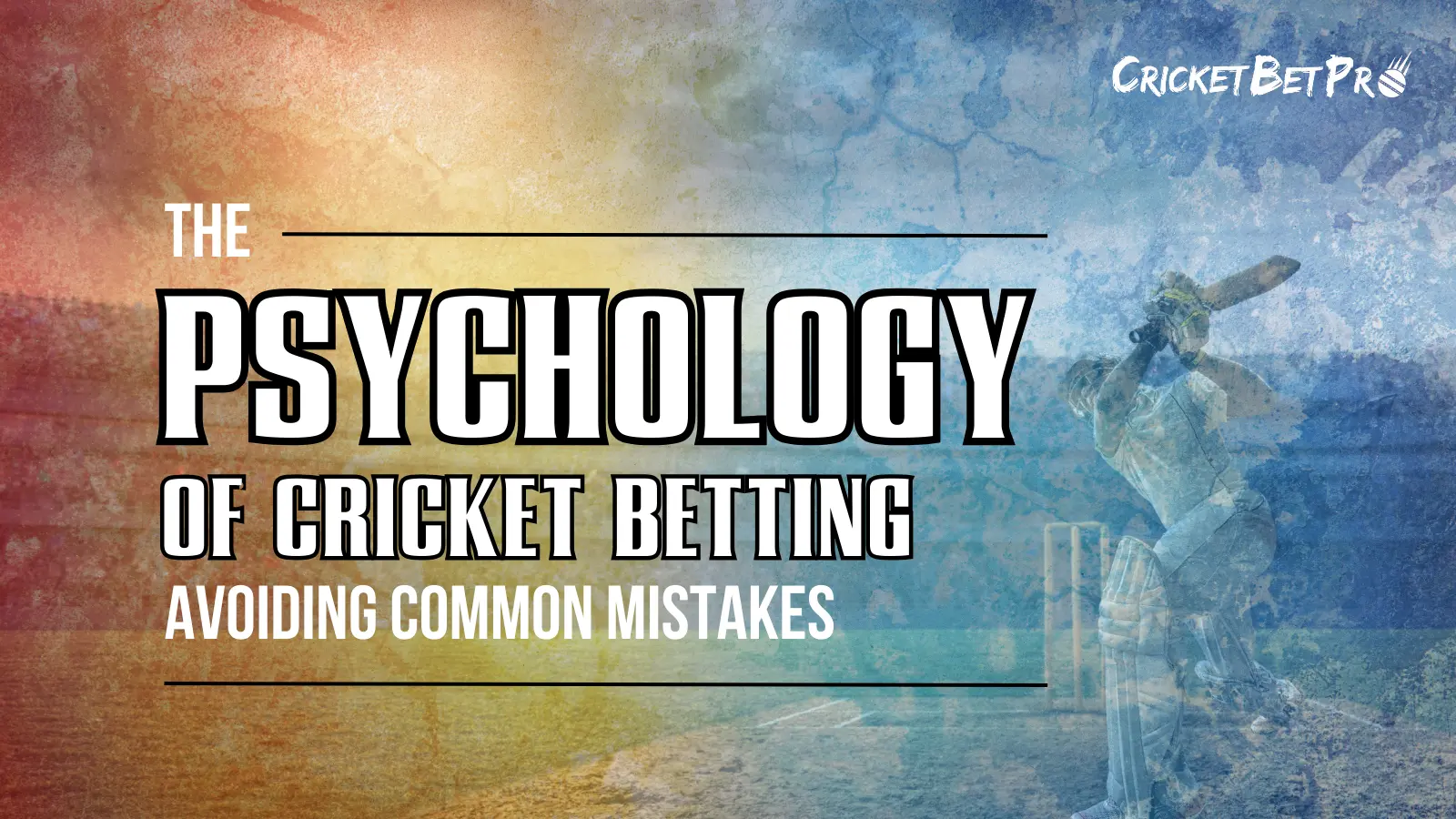The Psychology of Cricket Betting: Avoiding Common Mistakes

Cricket betting is more than just evaluating statistics, calculating odds, and predicting outcomes. It is also a psychological game. Your thoughts, feelings, and reactions can significantly impact your betting decisions and success. Many bettors, particularly beginners, fall into psychological traps that result in poor choices and losses.
Here, we will look at the psychology of cricket betting and offer practical suggestions to help you avoid frequent risks. Here is a list of multiple methods punters use to avoid mistakes and be sharp:
1. The Influence of Sentiments in Cricket Betting
The Problem –
- Placing rash bets during big matches.
- Dissatisfaction Recovering losses following a failed stake.
- Overconfidence refers to betting substantially on a “sure win” without conducting sufficient analysis.
The Solution –
- Relaxed and calculated approach.
- Set a budget and stick to it, regardless of success or loss.
- Take a break if you feel overcome by your emotions.
2. The Gambler’s Fallacy
The Problem –
- The gambler’s fallacy holds that previous experiences influence future outcomes in random events. Such as assuming a team is “due” for a win following a losing run.
- Believing that a batter will score large in the upcoming match because they failed in the last one.
The Solution –
- Each match is an individual occurrence. Past performance does not guarantee future results.
- Place your bets based on current form, conditions, and data, not anticipated trends.
3. Confirmation Bias
The Problem –
- Confirmation bias is the tendency to choose information that reinforces your pre-existing ideas.
- This includes ignoring stats indicating a team’s weakness due to fan bias.
- Overestimation of a player’s previous performance while neglecting their current downturn.
The Solution –
- Consider all relevant evidence in terms of data, even if it opposes your initial viewpoint.
- Consider why you assume a conclusion is likely and whether the data supports it.
4. Overoptimism and Illusions of Control
The Problem –
- Overoptimism might result in imprudent betting, such as betting significant amounts based on a “sure” event.
- Believe you have an advantage over bookmakers because of how much you know.
The Solution –
- Stay modest and recognise that no wager guarantees a win.
- Diversify your bets across several marketplaces to lessen risk.
- Keep a record of your wagers so you can honestly evaluate your success rate.
5. Chasing Losses
The Problem –
- Following losses typically involves increasing bets to recover money quickly.
- Consider doubling your bet after a loss to increase your chances of winning.
- Making rash bets without adequate analysis.
The Solution –
- Decide how much you will lose and stop when you reach that amount.
- Stick to an approach, instead of being emotionally affected by losses, stick to a defined betting strategy.
- Understand that losses are a part of betting and concentrate on for a long time success.
6. The Anchoring Effect
The Problem –
- The anchoring effect occurs when you emphasize the initial information you hear too much.
- Consider betting on a team based on prior success, even if their current performance is terrible.
- Emphasising a player’s reputation rather than their previous performance.
The Solution –
- Review current statistics and forms regularly.
- Avoid first impressions and consider all relevant information before making a decision.
7. Social Factors and Mob Mentality
The Problem –
- Social influence can lead to a mob mentality, in which you follow the crowd rather than make your own decisions. In this case, you bet on a team because everyone else does.
- Following advice from friends or on social media without conducting your research.
The Solution –
- Place your bets based on your research analysis rather than others’ opinions.
- Be skeptical- question common beliefs and seek facts to back them up.
8. The Availability Heuristic
The Problem –
- The availability heuristic refers to the propensity to overestimate the significance of easily recalled information, such as betting on a team based on their previous high-profile win.
- Ignoring less memorable but crucial information.
Solution –
- Consider a variety of data, not simply recent or memorable incidents.
- Gather information from various sources to gain a balanced perspective.
9. The Fear of Missing Out (FOMO)
The Problem –
- FOMO might result in impulsive betting.
- Consider placing a last-minute bet to maximize winnings.
- Betting on every game, even if the odds are adverse.
The Solution –
- Concentrate on matchups and markets in which you have a clear advantage.
- Select specific matches to wager on ahead of time and stick to your strategy.
10. Developing a Healthier Betting Mindset
The Problem –
- To avoid these psychological problems, maintain a positive betting mindset and set realistic goals.
- Instead of pursuing large payments, aim for steady, small victories.
The Solution –
- Stay disciplined and stick to your strategy, and avoid making rash decisions.
- Analyse your losses to find patterns and improve.
- Enjoy the process and treat betting as entertainment rather than a source of income.
Conclusion
Cricket betting involves as much psychology as information and strategy. Understanding typical psychological traps and how to avoid them can allow you to make better, more sensible judgments. Remember that successful betting is a marathon, not a sprint. Stay disciplined, aware, and, most importantly, in command of your emotions. Have fun betting!
Cricket Bet Pro is your ultimate destination for everything related to online cricket betting. As an independent platform, we specialize in reviewing online cricket betting sites, ensuring that cricket enthusiasts in India receive top-notch betting offers and match predictions supported by comprehensive data analysis.
Relevant news

How Does Sports Betting Work?
Sports betting is about predicting the results of matches and laying your money on it—and in…

MI-W vs GG-W Match Prediction: Who Will Win Today’s WPL 2025 Match?
After a thrilling month of cricket, WPL 2025 is now concluding. Delhi Capitals Women (DC-W)…
Ultimate Glossary of Online Betting Terms in India
Whether you're a seasoned bettor or just starting your journey into online betting in India,…

BC.Game vs Stake Comparison: Is BC.Game Better Than Stake?
BC.Game and Stake are popular crypto betting platforms in India, offering a variety of sports…

Cricket Apps: Revolutionizing the Fan Experience
For millions of fans, cricket isn’t just a game; it’s a way of life. With…

How to Earn Money in IPL Betting?
Betting in the Indian Premier League (IPL) can be thrilling and lucrative, but it requires…





Login
Register